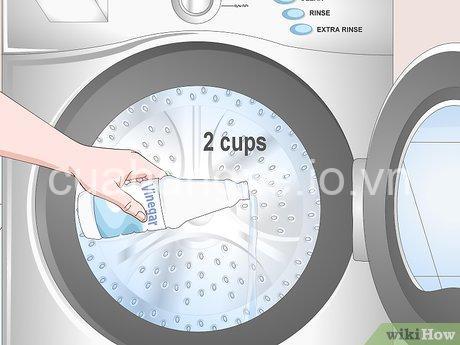Experience using washing machines
Prevent Washing Machine Odor: Understanding the Causes and Solutions
Prevent Washing Machine Odor: Understanding the Causes and Solutions. In today’s article, cuahangxe.io.vn will explore with you in the most detailed and complete way. See now!
Understanding the Root of the Problem: Why Your Washing Machine Smells
You might be wondering, “Why does my washing machine smell?” It’s not just a matter of dirty clothes! The culprit often lies in a combination of factors, each contributing to that unpleasant scent. Let’s break down the most common causes.
Bacteria and Mold: Imagine a dark, damp environment. This is the perfect breeding ground for bacteria and mold, and your washing machine, especially the drum, hoses, and detergent dispenser, can be a haven for them. The leftover moisture after a wash creates the perfect conditions for these microorganisms to thrive, leading to a musty, unpleasant odor.
Soap Scum and Detergent Buildup: Even if you’re using the recommended amount of detergent, a little bit of residue can linger, especially in the detergent dispenser. This leftover soap scum attracts bacteria and contributes to that musty smell.
Fabric Softener Residue: Fabric softeners, while designed to make clothes soft, can leave behind a sticky residue that attracts bacteria, further intensifying the odor problem.
Clogged Drain: If the drain isn’t working properly, water can become stagnant, creating a breeding ground for bacteria and contributing to a strong, unpleasant odor.
Other Factors: While less common, factors like infrequent cleaning, using too much detergent, and poor ventilation can also contribute to washing machine odor.

Practical Steps to Prevent Washing Machine Odor
Now that we know the causes, let’s dive into the solutions. Preventing washing machine odor is a simple matter of incorporating a few smart habits into your laundry routine.
Regular Cleaning: This is the foundation of preventing washing machine odor.
- Drum Cleaning: At least once a month, clean your washing machine drum using a solution of white vinegar or baking soda. Vinegar effectively breaks down bacteria and soap scum, while baking soda helps deodorize the drum. Simply add the solution to the drum, run a hot water cycle, and then wipe down the drum and rubber seal with a clean cloth.
- Detergent Dispenser Cleaning: Periodically clean the detergent dispenser to prevent buildup. Remove the dispenser and soak it in a mixture of white vinegar and warm water. Rinse it thoroughly and let it air dry completely before putting it back in place.
- Rubber Seal Cleaning: The rubber seal around the door is a common breeding ground for mold and bacteria. Wipe down the seal after each wash to prevent residue buildup.
- Cleaning the Washing Machine Hoses: If you suspect a problem with your washing machine hoses, it’s best to call a professional plumber for inspection and cleaning.
Washing Habits:
- Using the Right Amount of Detergent: Too much detergent can lead to buildup and create a musty smell. Always check the detergent bottle for recommendations on the amount to use for different load sizes and types of fabrics.
- Choosing the Right Detergent: Opt for a detergent designed to effectively remove dirt and odor, particularly if you’re dealing with smelly clothes or have pets.
- Using a Washing Machine Cleaner: Consider using a washing machine cleaner every few months to eliminate any lingering bacteria and soap scum.
- Leaving the Door Open After Use: After each wash, leave the washing machine door open to allow it to air dry completely. This will help prevent moisture buildup and reduce the risk of mold growth.
- Running a Hot Water Cycle: Occasionally run a hot water cycle with nothing in the drum to eliminate any residual bacteria or soap scum.
- Fabric Softener Alternatives: Instead of using fabric softener, consider using white vinegar, which acts as a natural fabric softener and helps prevent residue buildup.
Maintaining a Clean and Odor-Free Environment
Beyond your washing machine itself, maintaining a clean and odor-free laundry environment is crucial.
- Preventative Measures:
- Use a Drain Snake: Regularly use a drain snake to prevent clogs and ensure proper water drainage.
- Ensure Adequate Ventilation: Good ventilation is key to preventing moisture buildup, which can lead to mold growth. Make sure your laundry area has a window that can be opened, or invest in a fan to improve ventilation.
- Check for Leaks: Regularly check your washing machine’s water intake hose for leaks, as they can contribute to a damp environment and create an odor.
- Use a Washing Machine Cover: Consider using a washing machine cover to protect it from dust and debris, especially if you don’t use it frequently.
Troubleshooting Tips for Specific Odors
If your washing machine still smells, it’s time to pinpoint the source of the odor.
- Identifying the Source of the Odor: Start by checking the detergent dispenser for buildup and clean it thoroughly. Inspect the rubber seal for mold or bacteria. If you notice a strong, musty odor, it might indicate a mold problem.
- Addressing Specific Odors:
- Moldy Odors: To eliminate moldy odors, clean the washing machine drum and rubber seal with a solution of vinegar and water. You can also leave the door open to allow the machine to air dry completely.
- Soap Scum Buildup: To remove soap scum buildup, run a cycle with a washing machine cleaner. You can also add a cup of white vinegar to the drum and run a hot water cycle.
- Mildew-Like Odors: To remove mildew-like odors, make sure your laundry area is well-ventilated. Clean the washing machine drum and rubber seal with a solution of vinegar and water.
When to Seek Professional Help
If you’ve tried all of the above tips and your washing machine still smells, it’s time to call a professional. A plumber can inspect your washing machine’s drain and hoses for any issues. They can also recommend the best solutions for dealing with stubborn odor problems.
Why does my washing machine still smell after cleaning?
If your washing machine continues to smell after thorough cleaning, there may be a more significant problem. The drain may be clogged, the hoses may be damaged, or there may be a leak. It’s best to contact a professional plumber to inspect your washing machine and diagnose the problem.
What if I don’t have time to clean my washing machine regularly?
While regular cleaning is ideal, you can still take steps to minimize odor buildup. After each wash, wipe down the rubber seal and leave the door open to allow the machine to air dry. Run a hot water cycle with a washing machine cleaner once a month.
How often should I clean my washing machine?
It’s recommended to clean your washing machine at least once a month to prevent odor and buildup. If you use your washing machine frequently or notice a strong smell, you may need to clean it more often.
What are some natural ways to prevent washing machine odor?
White vinegar and baking soda are excellent natural cleaning agents for your washing machine. Use white vinegar to clean the drum, rubber seal, and detergent dispenser. Add baking soda to the drum and run a hot water cycle to deodorize the machine.
Conclusion
Keeping your washing machine fresh and odor-free is easy with a few simple steps. Regular cleaning, proper detergent usage, and a clean laundry environment will ensure your washing machine stays fresh. If you are looking for quality electrical and water products, don’t hesitate to visit cuahangxe.io.vn. And remember, you can reach out to me, Jennifer Nicole Smith, with any questions! I’m always happy to help.
